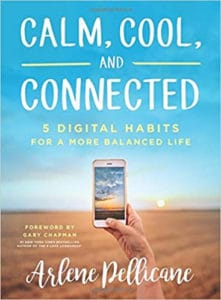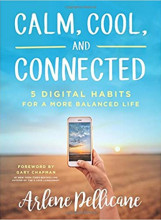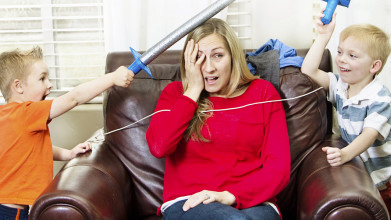Excerpt:
Arlene Pellicane: And so, there are things you can control and things you can’t. But what you can control is what shows are you watching? What news are you getting? How are you accessing it? You know, all those things. Those are things you do have control over. And I do believe when we’re wise in choosing that it’s going to lessen our anxiety.
End of Excerpt
John Fuller: Arlene Pellicane joins us today on Focus on the Family. Your host is Focus president and author Jim Daly. And I’m John Fuller.
Jim Daly: Hey, John, I am so thankful that we’re able to supply the majority of our team with the technology here at Focus to accomplish the mission. And thankfully, we were just ahead of that curve when we had the shelter-in-place orders come down and we had a plan working. If we had to work from home for a variety of reasons, what would we do? And so, the I.T., the tech group here at Focus did a fantastic job getting people equipped and ready to work from home. And we’ve been doing that for the last few weeks now. And man, I want to give a shout out to the entire staff. The response services team that handle all the incoming calls. The counseling team that will talk with you, the listeners, when you have a need in that area. Don’t hold back. Nothing will surprise us. That’s why we’re here. That’s why people support this ministry is to supply you with Biblical guidance and Biblical counseling. And we are proud that the team has stepped up and continued to work hard in this environment as more and more people need input about how they’re doing with their marriage, how they’re doing with their parenting. It’s an interesting moment in our culture being sheltered-in-place and being close to our loved ones a lot more than we’re used to. And I’ve enjoyed it. You know, the time that Jean and I have spent together just peeling back the pressure of time commitments. Um, I’m sure that many of you are working from home and you got this complexity of how do I keep it all going, spinning the plates and, you know, being a good spouse and being a good parent and being perhaps even a good son or daughter to your elderly parents. It’s all happening. And we’re going to talk today with a very special guest, a great friend, Arlene Pellicane, who can help us better understand the home environment and what we can do now to ensure that this is a positive adventure and not a negative one.
John: And Arlene is well equipped to address the topic. And she’s always a popular guest here at Focus on the Family. She’s written a number of books. And the one that really relates to the topic today and the times for today is called Calm, Cool, and Connected: Five Digital Habits for a More Balance Life. And she and her husband James have three children and live in the San Diego, California area.
Jim: Arlene, welcome back to Focus.
Arlene: It’s great to be with you.
Jim: Now, I’m always jealous. You live in the greatest, I think, area of the country…
Arlene: (Laughter).
Jim: …San Diego. The weather’s perfect all the time. And how are you doing?
Arlene: San Diego is kind of a good place to be holed up out. So, we can go around…
(Laughter)
Jim: No kidding.
Arlene: I’ll tell my kids, you know, we have palm trees here. And it’s not – to us is not glamorous. Like, there’s palm trees everywhere. And I want to have my children, “Do you know that there are people in this country who look at this palm tree and say, ‘Look. It’s a palm tree?'” You know, it’s the kind of the way we see snow. And just to be appreciative. So, yes, we’re doing well here.
Jim: (Laughter) Arlene, let’s get to this issue of that blurred vision that we’re having right now with everything at home. Trying to, you know, carve out a little working space for us and get the things done. The funniest thing – I’m doing, quite a bit of video meetings and Jean now has me positioned at our kitchen table out the window so nobody can see her running back and forth…
(Laughter)
Jim: …Between the – the shots, you know. So, and, uh, Trent and Troy know to kind of go quiet when dads on the, uh – the conference call. But what are some of those things you’re experiencing and ideas you might have about this blurred environment?
Arlene: Yeah, it is quite an adjustment. I saw this funny meme and it was Dolly Parton from that old movie, Nine to Five. And it said, “When you’re a parent working from home…” and then it was like, “Working 9:00 to 9:15, 9:20 to 9:25, 9:45 to 10, 10:20 to 10:30.”
(Laughter)
Arlene: And I was like, “That nailed it. That is, it.”
Jim: Right.
Arlene: Because when the kids are in school, you have this broad swath of time if you work at home. If you work in the office, obviously, you are working uninterrupted. And all of a sudden you have these interruptions happening. So, I think one thing is just lower that expectation of, you know, it’s not going to be the traditional nine to five. You are going to have questions throughout the day. Your older child may need help logging on to a, you know – a computer program. Your younger child may be like, “Okay, Mommy. It’s been half an hour. What are we doing now?” You know? So those things are going to happen. So, I just love to think of getting, you know, for some of you with younger kids maybe it’s two to three hours of solid work done and that might happen in 20 minute increments and that is OK. And that’s just kind of how it’s gonna be. Now, it’s also a great opportunity for your kids to step up because, you know, I’ve written these books when my kids – now they’re older. So, my youngest is in fifth grade. So, this is a little easier for me because I can tell a fifth grader, an eighth grader and a tenth grader. “Hey, I got to work for two hours. Food’s in the kitchen. See you later.”
Jim: (Laughter).
Arlene: I can – I can do that, you know. But you know what? Kids are so resilient and creative when we let them be that they could sit next to you with a bucket of toys if you train them that way. And if there’s no other option. (Laughter). When there’s no other option, then they learn that real quick. So, I think looking for blocks of time to work from home instead of thinking ideally, “Oh yeah, you’re gonna be there nine to five.” No, it’s probably not going to happen. And I’m in the same boat. I’ve, you know – have had speaking engagements canceled and different things so here I’m at home. So, I’m thinking, “What can I do to help people from home?” So, I’m doing this daily study, video study for my book, 31 Days to Becoming a Happy Mom. Because I figure there are some moms out there that are not so happy with this coronavirus time. (Laughter) And so, it’ll be this 10 minute snapshot and I do it on Facebook, Instagram, et cetera. So, I’ll yell down to the kids, “Okay, everybody quiet…”
Jim: (Laughter).
Arlene: “…For ten minutes. You know, no piano. No yelling at each other. No playing with the pool table. I can hear those balls.” You know…
Jim: (Laughter).
Arlene: …Like, “Nothing.” You know, and so they get used to this. And one time it was so crazy because it’s been going really smoothly. You know, really smoothly. But one day I hear this “boom, boom, boom, boom” like up the stairs. And I’m thinking, “Who in the world is coming?” And it’s my entire family with my husband, the three kids and the golden doodle. And the golden doodle is not even allowed upstairs.
Jim: (Laughter).
Arlene: So, I couldn’t believe it. And all of them…
Jim: Except when you’re not looking.
Arlene: Except when I’m not looking apparently.
Jim: (Laughter).
Arlene: And I’m doing this live thing and my whole family’s behind me. Like, I guess they had been in quarantine too long. And they’re like jumping up and down in the background…
Jim: (Laughter).
Arlene: …Completely distracting. And I was like, “You’ve got to be kidding.”
Jim: (Laughter) That’s so true.
Arlene: You know, I’m a mom-author. So that worked for me.
Jim: No, it’s so good.
Arlene: For some of you in a more serious job that could be a problem.
Jim: Well, that’s true. That’s right. And that’s part of the issue. Let me ask you, too. I mean, one of the things going on for Jean and I, it’s screen time. And, you know, Troy is a junior and the Daly household is more about – like at night, we’re going, “OK, how do we, you know, peal Troy away from the screens? And yet he’s got to do schoolwork. And, you know, he wants to do some gaming with his friends.” And it’s been a good time for him to connect with friends that way. But it usually is everybody’s normal sensitivities are even hypersensitive in this environment. When it comes to screen time, what suggestions do you have for the frantic or panicky parents who are worried that Junior or, you know, the little ones are getting way too much screen time?
Arlene: Yep. And you can kind of test your child. So, if you feel like, “Oh, my goodness, that’s – you know, it used to be five hours and now it’s seven hours. Or used to be two hours and now it’s, you know, five hours.” Whatever. You know, have a block of time. A Sunday is a great time to do it. To say, “Hey, we’re gonna do our online church. But then after that, we’re gonna do no screens until dinner.” Or “We’re going to from afternoon on, no screens.” And just see how your family does. And if your family is totally fine, like there’s no push back, there’s no questioning and they can do other things, then you can feel like, “You know, we’re going to be able to shift back into a more conservative gear in the future.” But if you see that, “Oh, wow. They cannot even go. You know, they used to be able to do this, but we can’t even go an afternoon without them complaining like, ‘Mom, what? Dad, what am I supposed to do? Or I can’t stop playing this game.'” Then, you know, OK, this is something more serious that we’re going to now not only have to deal with the coronavirus, but we’re gonna have to deal with the aftermath after the coronavirus of breaking, changing all these new screen habits that we have. That when the school is open, the kids are like, “I don’t want to go to school. I’d like to watch TV and play video games all day.” And that can be a hard thing to break. So, if you see that, hey, that reentry thing’s gonna be a challenge, then you can start kind of looking forward and saying, “Hey, you know, we’re going to power down at 7 p.m.”
Jim: I need a new intro for the family discussion.
(Laughter)
Jim: ‘Cause the other night – you know, the other night Jean saying, “We got to talk Troy. I mean, we just need to talk to him about where he’s at. You know, put a little higher bar up during this time.” So, I mean, I remember I said to Troy, it’s like, “Hey, Troy, Mom and I would like to talk to you in a few minutes. You got a moment we could talk with you?” He’s like, “What’s up?”
(Laughter)
Jim: “What have I done?”
Arlene: Dropped the ball.
John: Always bad.
Jim: “What’s the problem?” And, uh, I’ve got to come up with something new, “Hey, buddy, you want to come upstairs and, uh, you know, we’re going to do something in between doing something we’re gonna talk about something.
Arlene: Right.
(Laughter)
Arlene: I think you should go in your beautiful garage and like…
(Laughter)
Arlene: …Tinker and fix something and then be like, “Hey, by the way…”
Jim: And it’s not quite beautiful yet, but this week I’m gonna get at it.
Arlene: (Laughter).
Jim: And I think by the end of the week, it’s going to be spic and span.
Arlene: Yeah.
Jim: But hey, Arlene, when we’re looking at the quarantine situation – again, I want to be crystal clear for those listening that are struggling. Are you doing anything dramatic to differentiate between work and play? I mean, for Jean, it’s not a work and play thing. But we were talking the other day and, you know, a little bit with older teenagers, you know, Jean was saying, “I think there might be an expectation of breakfast, lunch and dinner.” I said, “Forget that. They make their breakfast. They figure out what they eat for lunch. And you’ll do a great job with dinner when we’re all around the table together. But don’t do it.” And she was like, “Yeah, I like that idea. You forage for breakfast and lunch…”
Arlene: Right.
Jim: “…And then I’ll make a good dinner.” What are some things – depending upon, you know, work separation. And then even like that, when you have kids that should be doing their things on their own don’t fall into temptation to take care of them right now because of your nervousness about the environment or you want to make sure your kids are calm. What are healthy and unhealthy things in that way?
Arlene: Yeah. And I think having some kind of rhythm – the same rhythm day after day after day. You know, obviously we might feel that way because it’s coronavirus. But you know, when you and your kids wake up that there is a similar wake time. I think that’s a wonderful way. And, you know, it’s different. So now for the girls and I it’s 8 o’clock, you know, is when we kind of show up at the breakfast table. Where before it used to be much earlier. But it’s 8 o’clock breakfast. And then the girls and I have been exercising. So again, when we’re talking about the screen time, I want to encourage us to think of digital vegetables and digital candy. So, the dig…
Jim: Okay. What’s that?
Arlene: Yeah. I want us to think digital vegetables. Those are the things in the rhythm of your day that are really good for you and your kids. And they’re things like Skyping Grandma and doing your history lesson and, you know, texting your teacher. Things like that. That’s digital vegetables those things you’ve got to get done, so go get it done. And it’s actually fun stuff, too. Like if you want to learn – for instance, my son loves 3D printing, so he wants to learn how to 3D print a Nerf gun. So, he’ll watch videos about that and then he’ll go do that. So, I feel like that’s digital vegetables is something you’re learning. It’s something practical and useful. Now the digital candy, that’s the like, “One more YouTube video. Let’s just watch it fall one more time.” You know? And that’s…
Jim: I don’t know how many times I can watch the Broncos 2015 football season to the Super Bowl…
(Laughter)
Jim: …But I have definitely gorged on that.
Arlene: Right.
Jim: I think I’ve memorized every play of Peyton Manning.
(Laughter)
Arlene: That’s so funny. So that’s like you in having digital candy, which is fine.
Jim: (Laughter).
Arlene: But if you have it eight hours a day…
Jim: Right. Never.
Arlene: …You know, it’s like – you can’t. It’s too much. So…
Jim: Especially with a pint of Haagen-Dazs.
(Laughter)
Jim: I would never do that.
Arlene: Right. Exactly. (Laughter) So, for us, you know, for that routine, it was that digital vegetable of, “Hey, we’re going to work out.” Which we would never have done before during the coronavirus. So, the girls and I do a 30 minute workout every morning together and it just frames the day really well both for work and for school. So, I do encourage you gets a little bit of exercise in in the morning. And believe it or not, even though you don’t feel like it, that you will feel better through the day. Like that will be actually energizing for you and that’s a positive use of screen time. So, I like having the same rhythm in the morning. So that starts out with the workout. Same rhythm at night. You know, basically five or six o’clock we’re having dinner and now we’re starting to do more like, you know – it could be a it could be a sitcom we watch together. It might be a game. It might be reading night. It might be nothing. Everybody kind of on their own. But it’s, you know, not everyone’s sitting there in front of a screen. And then obviously during that big chunk, that’s that 9:00 to 5:00, like, “Oh, Lord have mercy. Help us.”
Jim: (Laughter).
Arlene: “Is it only eleven o’clock?” You know?
Jim: Right.
Arlene: Then it’s breaking it up into chunks that, “OK, we’re going to work maybe let’s say for an hour and a half.” And the thing is for us now as adults we have got to be so productive. No more cyber loafing and looking, you know. I had to stop like all the shopping advertisements that I get my email box. I was like, “Those are way too distracting during coronavirus. I need to unsubscribe to all those lists.” So that when I sit down on my computer, I am actually working because the time is so precious.
Jim: Hmm.
Arlene: And your kids are wired different. Some of your kids – like my kids are independent learners so I can trust them that they’re actually doing what they’re supposed to be doing because one child is super like, “This is what the rule says…”
Jim: (Laughter).
Arlene: “…I will do it exactly…” Like she’ll say, “Oh, mom, like we can’t… ” And I’m like, “It’s fine.” “No, no.” You know? So, I know she’s going to be – that child is going to be fine. I have one child. If it’s due in two weeks they will get it done in two days and be like, “Good. I don’t have to think about it.” I have another child to – due in two weeks. They’ll get it done, you know, in 12 days. They’re still under the deadline, but you know. So, everybody’s different. So, you can think about your kids. And for my kids, like with the older ones, if you’re hovering too much, that could be not so good because it reminds me of my husband. If he’s like, “Do you really need to eat that other cookie?”
Jim: (Laughter).
Arlene: And it’s like, I don’t need…
Jim: Ouch. (Laughter).
Arlene: …Someone telling me if I need to eat a cookie or not. You know? And I and I can think that’s how our kids feel when we’re like, “Did you do your math homework?” And it’s like, “I know to do my math homework, Mom.” So sometimes less is more. For many kids, less direction and just checking in beginning of the week, “Do you – what’s expected of you this week?”
Jim: That’s good.
Arlene: End of the week, “How did it go this week?” Like you don’t need to check all the time. You probably have access to their grades. And so, I’ll check that maybe every two weeks. I’m not on there every day checking like, “Oh, what did my child do?”
Jim: That’s wise.
Arlene: You know? So just have that rhythm. And if you’ve got that child who does need that supervision, who you’re like, “If I do not stay on that child, that child is going to get nothing done all week.” You know, then it really is saying, “You know what? Here are the expectations for the day. If you do these expectations, you will have dinner. If you do not do these expectations, you will not have dinner.”
Jim: (Laughter).
Arlene: “And, you know, you might kick and scream.” But eventually, if you can embrace that, your child will figure it out like, “Yeah, I guess I better do my math homework because I’m kind of hungry.” You know, so…
Jim: That’s pretty tough boot camp there.
Arlene: Boot camp, man.
John: (Laughter).
Arlene: So, and, you know, your kid will not die.
Jim: (Laughter).
Arlene: Believe me, there are enough snacks in your pantry your kid will live. So, it’s gonna be just fine, you know. But just have that thought of, “How can I make sure to put that monkey on your child’s back?”
Jim: Yeah.
Arlene: “It is your responsibility to do your homework, not mine.”
Jim: Yeah. Good training time.
John: Yeah. Appreciate the, uh – the rhythms, routines and boundaries that Arlene Pellicane is suggesting today on Focus on the Family. We’re making her book available on our website. It’s called Calm, Cool, Connected: Five Digital Habits for a More Balanced Life. And, uh, you can find that at focusonthefamily.com/broadcast. Or when you call 800, the letter A and the word FAMILY.
Jim: Arlene, John mentioned that great book you have – Calm, Cool and Connected. And it really is to help people disconnect from distractions. Social media screen time is a big part of it, but really the disconnect from other distractions too and connect to those you love, your family, et cetera. You have an acrostic in there called HABIT. What are the – the meanings of that acrostic HABIT. And then let’s just look at “H” and “I”. So, what are the five?
Arlene: Yeah. And it really is. These are things you can do – they’re systems. The “H” is “hold down the off button.” The “A” is “always put people first.” “B” – “brush daily – live with a clean conscience.” “I” – “I will go online with purpose.” And “T” – “take a hike.” Get yourself out of that zone of staring at your computer. Start moving. Get outside.
Jim: Okay. Great. We’ll post those at the website, John.
John: Mm hmm.
Jim: But let’s start with “H.” Again, we’re not going to go through all five – I don’t think. But “hold down the off button” can mean a lot to spouses.
(Laughter)
Jim: You might want to clarify that one.
Arlene: (Laughter).
Jim: Hey, I am going to hold down the off button right now and not listen.
(Laughter)
Arlene: That is not what I am telling you.
Jim: Okay. I’m sorry.
Arlene: I am talking about on your dear little phone there is an actual off button.
Jim: Oh, that one.
Arlene: Not on all the time. And it’s the idea that there are moments in your day where it is appropriate not to have your phone accessible. Not to have it on. Uh, that, you know – bedtime would be one ritual. I think 71% of Americans sleep right next to that digital binkie. And maybe with coronavirus were just that much closer. (Laughter) We’re just like so much closer, right?
Jim: Yeah.
Arlene: But we need more of those moments. Silent moments where we can think. Where we can reflect about how our family’s doing. And, you know, it’s like a digital binkie many times for some of us…
Jim: (Laughter).
Arlene: …That, you know, when we have – when we have a newborn, we keep it real close all the time. Right? “How you doing? Too hot? Too cold?” And we can be that way with our phones. Like, “Is it – it’s got be close by. Is it dry?”
Jim: Oh yeah.
Arlene: “Is it charged?” You know? And so, just for us to realize mealtime is a great time to hold down the off button. Bedtime even for your teenager. Right? This is gonna make you really popular, saying, “Hey, you know what…”
Jim: Maybe especially for your teenagers. (Laughter).
Arlene: “Hey, we’re going to collect your phone at 11:00 p.m. and you can get it at breakfast.” And your teenager is not gonna be like, “Oh, thanks for protecting my sleep. That’s gonna make me a better human being.” You know? Your teenager is gonna be like, “What? You can’t do that. You don’t have the right to do that.” And you’re gonna be like, “Well, you live in my house and I most likely pay your bill. So, yeah…”
Jim: (Laughter).
Arlene: “…I do I have the right to do that.” You know?
Jim: (Laughter).
Arlene: So – so get that – that might be something to do. But again, be ready. They’re not going to be excited about that. But that’s a good time to hold down the off button because they’re not getting wonderful texts about Bible study at 3 a.m. in the morning. You know?
Jim: Oh, yeah.
Arlene: And we’re not – not sleeping well when we’re with a phone and wondering, “Is it going to go off?” And so, that’s so important for kids and adults. And, you know, sometimes we need a little bit of extra help. I remember my daughter Noelle when she was about two, she loved to suck her thumb and she would just chew it till it was raw.
Jim: Ew.
Arlene: So, my husband, James, is very creative and he’s had these pajamas that were too big for her. And he sewed up the ends on the sleeves so her hand couldn’t go through.
Jim: (Laughter).
Arlene: So, at night when she went to bed, she went to suck her thumb, and it wasn’t there. Like she could find it. And she cried and cried and cried and cried the first night, but by about night, three, four or five, she kind of realized like, “I guess my thumb is not there anymore.” And she started going to sleep.
Jim: Wow.
Arlene: And it was that training, right? Like she couldn’t get to it.
Jim: Yeah.
Arlene: And then after about a month, we could switch her out to normal pajamas. And then she stopped, you know, biting her thumb so severely. And for some of us, we need some help because we get to our phone and there is just nothing stopping us. Whether we’re an adult teenager, a child. It’s like, “I need that iPad. I need that video game. I got to check my social media. I’ve got to see the news.” You know, used to be that a newspaper…
Jim: Oh. Yeah.
Arlene: …You know, you’d see it in the morning. Right? Front page. Back page. Close it up. It’s done. Now, my goodness gracious, every headline. What’s going to happen? What happened next? And all day long. And so sometimes we need outside intervention to sew up our sleeves so to speak so we’re not constantly checking. So, I think it’s so important to have space in your day where you do put your devices somewhere else and you do something totally different.
Jim: Yeah. Let’s quickly cover the “I” of HABIT. And again, we’ll post this at the website. And most importantly, people need to get your book and hopefully through Focus. But what’s the “I” of HABIT?
Arlene: Yes, it is. “I will go online with purpose.”
Jim: (Laughter).
Arlene: And it’s the idea…
Jim: That sounds like a shopping opportunity.
Arlene: That’s right. (Laughter) But that works if you’re going for shoes. You get shoes. You don’t get shoes, a jacket, a scarf. You know?
Jim: (Laughter).
Arlene: I’m talking to you ladies. Okay? It’s online…
Jim: It’s not shoes.
Arlene: (Laughter) It actually works on purpose. You know, and it’s asking yourself, “What am I here to do?” So, before you start up your desktop computer, “What am I here to do? OK, I’m going to check my email. I’ve got to work on this project. Hey, you know what? I should probably flip those. I should probably work on the project first while I’m fresh and then I’ll go to my e-mail.” That’s something I am still working on. You know? And then you pick up your phone. “What am I here to do? I’m here to text my mother. I am here to check my grocery list. I’m here to check the weather.” Then I put it down. So, it’s this intentionality of there’s a purpose for this. It used to be devices had a purpose. You went to a record player because you wanted to play a record and you went out to grab your newspaper because you wanted to read the news. It’s like everything had a purpose. But now you pick up your phone and you’re like, “Awesome. I can watch TV. I can play video games. I could check my email. I can check Instagram.” Like there are too many things to do. And then you waste so much time. That’s why you have to get – to get in the matrix and realize, “Wait a minute. This is all setup to distract me, but I will not succumb. You know, I will go into my social media. I will set a timer for ten minutes. I will go through the feed and then I will be done for the day.” You kind of have to make systems to make it work for you.
Jim: Arlene, as we wrap up, I think going back to the title of your great book, Calm, Cool and Connected. What’s that quintessential one thing that people can do if they’re in kind of that panic mode about juggling school at the house and trying to make sure kids are doing well, and then men – I got work responsibilities or other responsibilities and it just feels like a heavy burden right now because they’re to your point, there’s not these distinctions and these compartmentalizations for the person that’s feeling stressed out. What is your best encouragement for them?
Arlene: Yeah. I would reframe this time because you can frame it like, “Oh, this is awful. Like we are barely making it.” Or you can frame it like, “You know, this is a unique period of history where our family may never have this opportunity again.” For college kids to come home. For adult kids to come home. For me to have this time with little kids and not be working and be home and – and see them grow up. So, reframe it like, “You know, as long as we’re stuck here, what’s something that we can gain and what something wonderful about this moment?” And then on a practical side, when you lay your head on the pillow tonight, ask yourself, “What went well today?” So, you don’t beat yourself up about everything. There’s something that went well today. “What went well today? What a disaster today?”
Jim: (Laughter).
Arlene: And then the next day, you know – and I would suggest just beat the kids by, you know, five minutes, wake up earlier than them and write down what’s something that could happen? Like think about it. Like what’s something that would help what was so frustrating yesterday? So, what’s something we could change today that would address that frustrating thing? And just concentrate on that. So, have that mindset like, “This can change. This can get better. I can learn. My kids can adjust.” And look for those specific things that may be very small but would really change the atmosphere in your home.
Jim: Well, that’s great advice. And Arlene, it’s always so good to have you with us. Thank you for making the time from lovely San Diego in your beautiful home to talk to us about how to manage all these competing interests in our home right now as we’re sheltered-in-place. And thank you for the great advice to do that. And let me turn to the listeners and the viewers. We’re here to help you. We started the program in that place and we’re ending it there. If you need some specific help in any area of your life right now that’s causing you stress call Focus on the Family. Get a hold of us. We have caring, Christian counselors who can help you. We have wonderful resources like Arlene’s great book and much, much more. In fact, one of the things we have, a friend of mine, Chip Brown, and his family created a game called The Rank Game. And it’s just a way that he felt he wanted to get his family out of electronics, around the table. And it’s a fun eye-opener about how you rank things. And it’s a bunch of cards that just do that. But Trent, Troy, Jean and I probably had a two hour conversation when we first played that game about what their purpose was. Why they were ranking things the way they did. That’s exactly what Chip was aiming for. So, go to the website, check out The Rank Game as well to get your family out of isolation with themselves and into family discussion. It’s a great idea.
John: Well, we do have The Rank Game. We have Arlene’s great book, Calm, Cool and Connected. And we’re going to be posting that acrostic HABIT online. All for you at focusonthefamily.com/broadcast. Or call 800, the letter A and the word FAMILY. And as Jim said, if you’re able to support the ministry, that’s how we stay on the air and keep providing great resources. Your gift of any amount will mean so much. And we’ll say thank you for joining the support team by sending a copy of Arlene’s terrific book, Calm, Cool and Connected.
Jim: Hey, Arlene, I think we’ve kept your husband and your kids in the closet long enough.
(Laughter)
Jim: Why don’t we – we’ll say goodbye.
Arlene: Like, come on out guys.
(Laughter)
Jim: They can come out of the closet now and have some fun and throw some – I guess, some pool balls down the staircase or something.
Arlene: That’s right. (Laughter).
Jim: But bless you. Thank you for being with us. We love you and so appreciate you.
Arlene: Thank you. That you so much.
John: And thanks again for joining us today. And please, we’ll say it one more time. We’re here to serve. So, if we can be of any assistance to you our number is 800, the letter A and the word FAMILY. Well, join us again tomorrow as we have Dr. Greg and Erin Smalley with us talking about how to reconnect with your spouse.
Teaser:
Erin Smalley: I long to know what’s going on inside of Greg and I long to share what’s going on inside of me. I personally did not get married to be stuck in an eternal business meeting with Greg. You know, talking about finances and conflict. What I really long for is to know that he cares, that I care, and hearing what’s really going on. But that will not happen intentionally unless we pursue it.





















